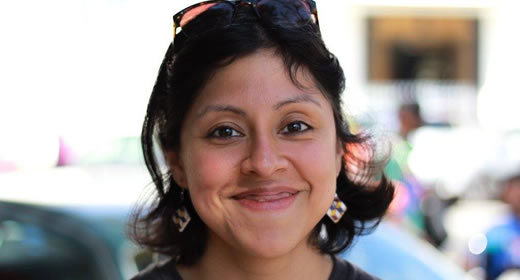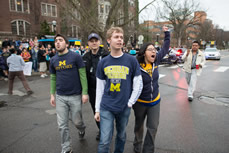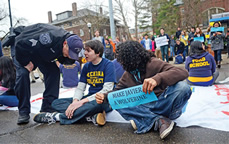
On April 17, 2013, at approximately 6:00 p.m., 50-60 people gathered outside the Michigan Union, at the intersection of State Street and South University. U-M student activists and Ann Arbor community members had come to protest the University's in-state tuition policy, which at that time excluded undocumented Michigan high school graduates. By 7:00 p.m., the protesters had blocked the intersection. "What do we want?" they chanted, in a classic protest call and response. "Tuition equality! When do we want it? Now!" Eight were arrested, including Ford School alumna Marisol Ramos (MPP/MA '13) who, despite her youth, has been an immigrant rights activist and organizer for nearly a decade.
Over a cup of coffee in southwest Detroit's Cafe Con Leche, Ramos talked about the demonstration and her work as an activist. Her parents emigrated from a small, rural town in Mexico to the Bronx in New York City, where Ramos was born. "I didn't really become involved until I was in college, in the mid-2000s and right around the time of the big immigration marches of 2006," Ramos explained. "I became politically aware and worked as a youth organizer with immigrant communities in New York. And that led to my involvement in immigration issues at the state level." In 2005, Ramos cofounded the New York State Youth Leadership Council, an organization that promotes equal access to higher education for young immigrants, leadership development, and grassroots organizing. She is also a cofounder of the United We Dream Network, the largest organization led by immigrant youth in the country. But after years of activism and accomplishment, Ramos realized that she lacked the policy training to be a truly effective advocate for the rights of immigrant youth. And so she came to the Ford School, where her activism background provided a context for what she was learning in policy courses.
 |
|
Marisol Ramos (MPP/MA '13) (right) being arrested outside the Michigan Union during an April 17 protest. |
Ramos' recalled Professor Richard Hall's core politics course (currently "Politics, Institutions, and Processes: National") where students explored how to size up stakeholders in the policymaking process. "When you get to writing a bill, for example, there is a cast of characters that you have to keep in mind," said Ramos. She realized that she herself was one of those stakeholders: "And if we're not included in that policymaking process, our voices are ignored."
In an education policy course with Chuck Wilbur, she began to research the issues surrounding public university tuition for undocumented youth in Michigan. Ramos explained, "I did a lot of calling people, doing one-on-one interviews. When I started working at the Forum [The National Forum on Higher Education for the Public Good], I continued having conversations with different administrators at higher education institutions, including Wayne State University and Ferris State. In all those conversations, everybody said, 'If [the University of] Michigan does it, then we might,'" Ramos recalled. "That meant we had to get U-M to do it."
As a seasoned organizer, Ramos served as an advisor for the Coalition for Tuition Equality (CTE), founded by Kevin Mersol-Barg (BA '13) in 2011. CTE eventually comprised over 30 organizations working to secure in-state tuition for undocumented Michigan students. "Marisol played a really fascinating role," said Mersol-Barg. "She spent numerous years in New York working with activists across the country around this issue. She facilitated our work with the National Forum on Higher Education. She also mediated between CTE and some national activists so we could find ways to bring them to campus."
 |
|
A U-M police officer talks with Kevin Mersol-Barg (BA '13) as he sits in the middle of State Street, blocking the flow of traffic. |
CTE applied external pressure to U-M administrators by educating the broader campus community about the issue, bringing national speakers to campus, and staging demonstrations. But the organization also worked internally with University administrators on a task force initiated by then-University Provost Phil Hanlon in April 2012. Lester Monts, senior vice provost for academic affairs, chaired the task force, which had been charged with researching the pros and cons of tuition equality. "I enjoyed working with all of them [CTE students]. We visited California universities—Berkeley and UCLA—and met with a number of people and found that there was enormous support for undocumented students," said Monts, who noted that, from the very beginning, the provost's office had been responding to activism by students like Ramos, Mersol-Barg, and the Coalition for Tuition Equality.
In March 2013, the task force presented its findings to the U-M Board of Regents. On July 18, the Board of Regents passed new guidelines extending in-state tuition rates to U.S. military veterans and to undocumented students who graduated and attended a Michigan high school for at least three years and a Michigan middle school for at least two years.
Photo (top): Gabriel Martinez
Protest Photos: Terra Molengraff/Michigan Daily
Below is a formatted version of this article from State & Hill, the magazine of the Ford School. View the entire Fall 2013 State & Hill here.
